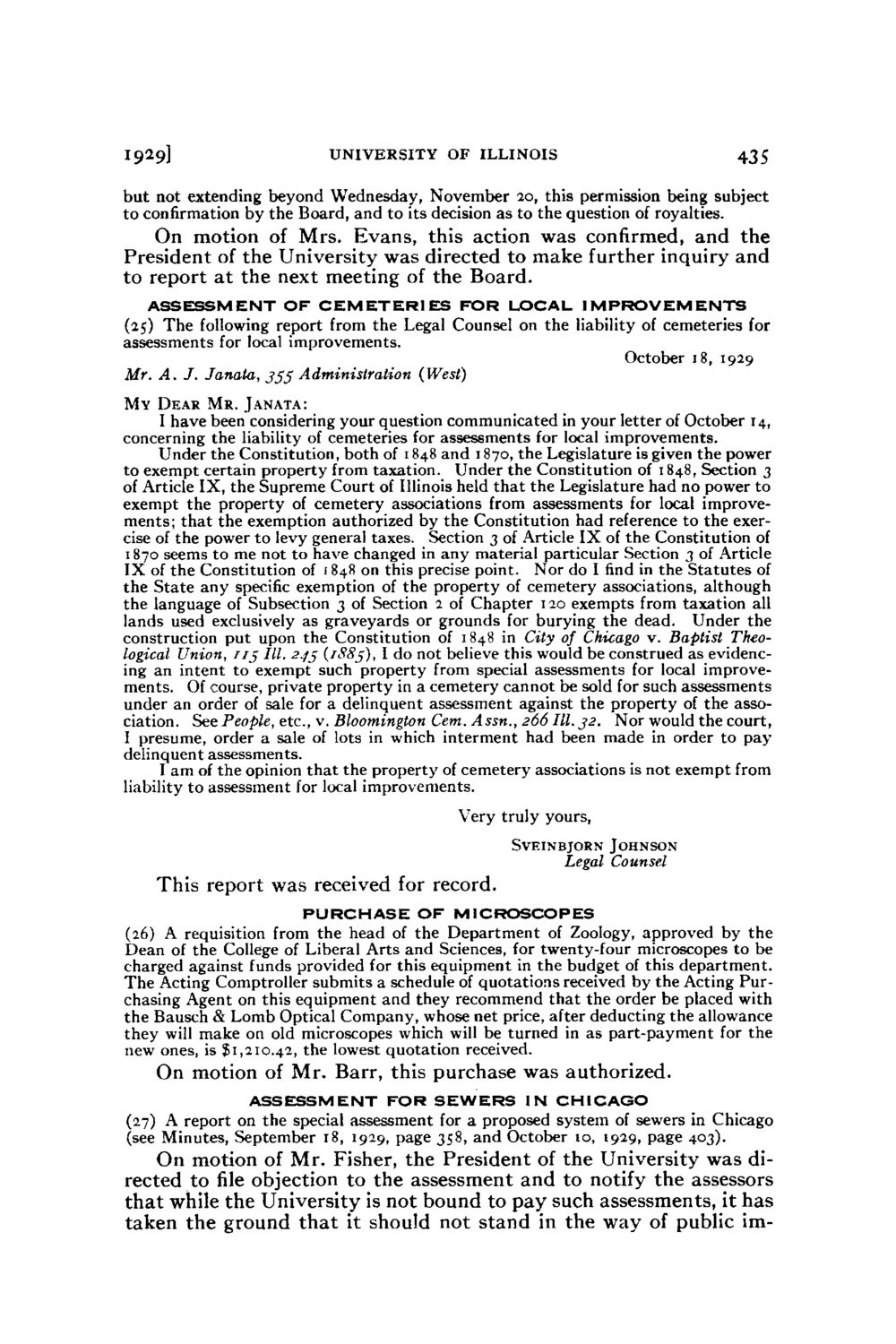| |
| |
Caption: Board of Trustees Minutes - 1930
This is a reduced-resolution page image for fast online browsing.

EXTRACTED TEXT FROM PAGE:
1929] U N I V E R S I T Y O F ILLINOIS 435 but not extending beyond Wednesday, November 20, this permission being subject to confirmation by the Board, and to its decision as to the question of royalties. O n m o t i o n of M r s . E v a n s , this action w a s confirmed, a n d the President of the University w a s directed to m a k e further inquiry a n d to report at the next meeting of the B o a r d . ASSESSMENT OF CEMETERIES FOR LOCAL IMPROVEMENTS (25) The following report from the Legal Counsel on the liability of cemeteries for assessments for local improvements. October 18, 1929 Mr. A. J. Janata, 355 Administration (West) My Dear Mr. Janata: I have been considering your question communicated in your letter of October 14, concerning the liability of cemeteries for assessments for local improvements. Under the Constitution, both of 1848 and 1870, the Legislature is given the power to exempt certain property from taxation. Under the Constitution of 1848, Section 3 of Article IX, the Supreme Court of Illinois held that the Legislature had no power to exempt the property of cemetery associations from assessments for local improvements; that the exemption authorized by the Constitution had reference to the exercise of the power to levy general taxes. Section 3 of Article I X of the Constitution of 1870 seems to m e not to have changed in any material particular Section 3 of Article IX of the Constitution of 1848 on this precise point. Nor do Ifindin the Statutes of the State any specific exemption of the property of cemetery associations, although the language of Subsection 3 of Section 2 of Chapter 120 exempts from taxation alt lands used exclusively as graveyards or grounds for burying the dead. Under the construction put upon the Constitution of 1848 in City of Chicago v. Baptist Theological Union, 115 III. 245 (/S85), I do not believe this would be construed as evidencing an intent to exempt such property from special assessments for local improvements. Of course, private property in a cemetery cannot be sold for such assessments under an order of sale for a delinquent assessment against the property of the association. See People, etc., v. Bloomington Cent. Assn., 266 III. 32. Nor would the court, I presume, order a sale of lots in which interment had been made in order to pay delinquent assessments. I a m of the opinion that the property of cemetery associations is not exempt from liability to assessment for local improvements. Very truly yours, Sveinbjorn Johnson Legal Counsel This report was received for record. PURCHASE OF MICROSCOPES (26) A requisition from the head of the Department of Zoology, approved by the Dean of the College of Liberal Arts and Sciences, for twenty-four microscopes to be charged against funds provided for this equipment in the budget of this department. The Acting Comptroller submits a schedule of quotations received by the Acting Purchasing Agent on this equipment and they recommend that the order be placed with the Bausch & L o m b Optical Company, whose net price, after deducting the allowance they will make on old microscopes which will be turned in as part-payment for the new ones, is $1,210.42, the lowest quotation received. O n m o t i o n of M r . Barr, this purchase w a s authorized. ASSESSMENT FOR SEWERS IN CHICAGO (27) A report on the special assessment for a proposed system of sewers in Chicago (see Minutes, September 18, 1929, page 358, and October 10, 1929, page 4°3). O n m o t i o n of M r . Fisher, the President of the University w a s directed to file objection to the assessment a n d to notify the assessors that while the University is not b o u n d to p a y such assessments, it h a s taken the g r o u n d that it should not stand in the w a y of public im-
| |